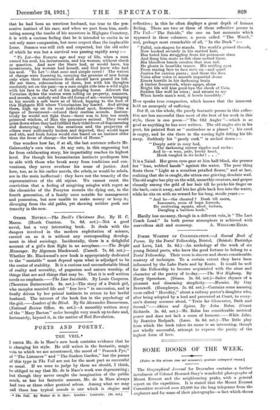POETS AND POETRY.
THE VEIL.*
I Timm Mr. de la Mare's new book contains evidence that he is changing his style. He still writes in the fantastic, magic vein to which we are accustomed, the mood of " Peacock Pye," of " The Listeners " and " The Sunken Garden," but the poems of this type in The Veil are not for the most part as successful as usual. If we were to judge by them we should, I think, be obliged to say that Mr. de la Mare's work was degenerating ; but though they never caught the imagination of the public much, as has his fantastic manner, Mr. de la Mare always had two or three other poetical selves. Among what we may call these less typical moods is one which is elegiac and -4 The Veil. By Walter do is 11are. London : Constable. [Os. neLl reflective ; in this he often displays a great depth of human feeling. There are two or three of these reflective poems in The Veil—" The Suicide," the one on last moments which appeared in these columns; a poem called " The Wreck," and, perhaps most remarkable of all, " In the Dock " :— " Pallid, mis-shapen lie stands. The world's grimed thumb,
Now hooked securely in his matted hair, Has haled him struggling from his poisonous slum And flung him mute as fish close-netted there.
His bloodless hands entalon that iron rail.
He gloats in beastlike trance. His settling eyes From staring face to face rove on—and quail. Justice for carrion pants ; and these the flies. Voice after voice in smooth impartial drono Erects horrific in his darkening brain A timber framework, where agape, alone Bright life will kiss good-bye the cheek of Cain. Sudden like wolf he cries ; and sweats to see When howls man's soul, it howls inaudibly."
Here speaks true compassion, which knows that the innocent hold no monopoly of suffering.
But if, on the whole, the purely fantastic poems in this collec- tion are less successful than most of the best of his work in this style, there is one poem—" The Old Angler "—which is as good as anything he has ever written. The old angler sits in his punt, his painted float as " motionless as a planet " ; his creel is empty, and he sits there in the waning light fishing his life away. Suddenly his " gaudy cork " is sucked down :- "Deeply astir in oozy bed,
The darkening mirror ripples and rocks : And lo—a wan, pale, lovely head, Hook tangled in its locks ! . . ."
It is a Naiad. Her green eyes gaze at him half-blind, she presses her " lean, webbed hands " against the water. The poor thing floats there " Light as a scentless petalled flower," and at last, realizing that she is caught, she utters one grieving, desolate wail.
The old angler has pity on the wild, unearthly creature, and gropes clumsily among the gold of her hair till he pricks his finger on the barb, cuts it away, and lets her glide back free into the water, while he sits on with no reward for his long, sterile years :—
" And he—the cheated ? Dusk till morn, Insensate, even of hope forsook, He muttering squats, aloof, forlorn, Dangling a baitless hook."
Hardly less uncanny, though in a different vein, is " The Last Coach Load." In both poems atmosphere is achieved with
marvellous skill and economy. A. WuLtAms-Emis.


































 Previous page
Previous page